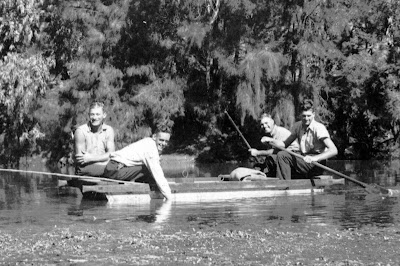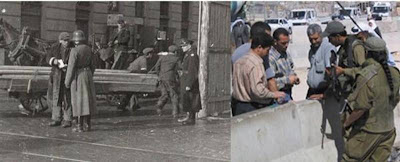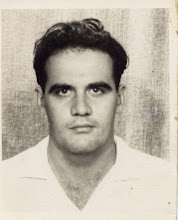Friday, November 26, 2010
Monday, April 12, 2010
Photo Essay: Memories of Wyreema -- Paddock and Sky
Paddock and Sky
You can see the power poles on the horizon. That’s where the road is. To the left is Wyreema and the other way takes you to Southbrook. The road is bitumen now but in the old days it was just the black soil packed flat and smooth. The car’s tyres sang their pleasure and up ahead the mirage made water on the road – but always up ahead never to be reached. When it rained these black soil roads were all but impassable. Only the cream carrier’s truck could plough its way ahead. He collected the cream and delivered mail; huge tank loaves of bread; and massive parcels of meat, wrapped up in many layers of newspaper and tied up securely with binder twine. If the cream carrier couldn’t get through no one could. I saw him as a demigod, master of country roads.
The sky: because all the horizons were wide and flat, it was more massive than what I knew back home. It was hard to ignore. The grown-ups were always looking up into it: to tell the time Dad told me and I suppose to guess what the weather was going to do. On the farm the weather mattered.
Look to the heavens
if you must, but don’t forget
the black earth below.
Wednesday, May 27, 2009
The Shock of the Old
At the university I left my friends and made my way to the car park. On the way I came to the University art gallery and on a whim, perhaps hoping to experience the transformative effect of art, I went in.
There were a large number of paintings by an artist whose name I have managed to forget. They were portraits in oils, that medium being applied with a trowel, thickly and in great daubs. Despite the crudity it was quite clever and it was even possible to tell who was being depicted. There was Captain Cook and Albert Namajira that I could discern without too much effort, and no doubt I would have recognised others had I tried. Both those pictures were “inspired” by well-known paintings from a previous era. Perhaps the artist felt they needed improving upon – or needed a modern interpretation in the post-modern manner. I suppose if the theatrical world has its Barry Kosky the world of art must have its…
Yes clever, but to use Orwell’s words, “Like farting Annie Laurie through a keyhole, clever but not art.” Yet oils, en masse, are such a delicious medium, evoking such ineffable unconscious infantile pleasures the effect of what’s-‘is-name’s work was quite agreeable.
But I soon had had enough and found myself transfixed in front of the pipe organ – left over from the days when the building was a concert hall. I took in the heart-stopping beauty of it, admiring the classical shapes it displayed – all determined by function, unimpeded by the need to intrude on the viewer’s own perception. And the colour of it, nearly monotone with subtle graduations of tone that gently emphasized the white and black of the knobs on the console.
As I stood there gawking, my meditation was interrupted by a young lady attendant who engaged me in conversation. I confessed, “I am trying to work out why I find the organ more visually exciting than the paintings.” She replied in a polite non-confronting manner and spoke of the organ recitals that were conducted there and directed me upstairs where there was an exhibition ironically called, Triumph in the Tropics.
If I had failed to be shocked and confronted by the paintings as I suspect I should have been, I was definitely shocked and confronted by this display. It consisted of posters, booklets and other surviving artefacts from the past. My youth was there, all on public display. How dull and crass it all was. But this is not how I remembered those days. It was a shameful libel. I am reminded of one of my children when little, after viewing old photos, wanted to know if the olden days were in black and white! I tried to explain that it was just as colourful, perhaps more so. The sky was as blue, the girls were as pretty, the boys were just as uncouth. I staggered out, clutching an image of the logo of the Department of Public Instruction close to my heart for comfort – a memory of happy school days.
xxxxxxxxxxxxxxxxxxxxxxxxxxxxxxxxxxxxxxxxx
There were a large number of paintings by an artist whose name I have managed to forget. They were portraits in oils, that medium being applied with a trowel, thickly and in great daubs. Despite the crudity it was quite clever and it was even possible to tell who was being depicted. There was Captain Cook and Albert Namajira that I could discern without too much effort, and no doubt I would have recognised others had I tried. Both those pictures were “inspired” by well-known paintings from a previous era. Perhaps the artist felt they needed improving upon – or needed a modern interpretation in the post-modern manner. I suppose if the theatrical world has its Barry Kosky the world of art must have its…
Yes clever, but to use Orwell’s words, “Like farting Annie Laurie through a keyhole, clever but not art.” Yet oils, en masse, are such a delicious medium, evoking such ineffable unconscious infantile pleasures the effect of what’s-‘is-name’s work was quite agreeable.
But I soon had had enough and found myself transfixed in front of the pipe organ – left over from the days when the building was a concert hall. I took in the heart-stopping beauty of it, admiring the classical shapes it displayed – all determined by function, unimpeded by the need to intrude on the viewer’s own perception. And the colour of it, nearly monotone with subtle graduations of tone that gently emphasized the white and black of the knobs on the console.
As I stood there gawking, my meditation was interrupted by a young lady attendant who engaged me in conversation. I confessed, “I am trying to work out why I find the organ more visually exciting than the paintings.” She replied in a polite non-confronting manner and spoke of the organ recitals that were conducted there and directed me upstairs where there was an exhibition ironically called, Triumph in the Tropics.
If I had failed to be shocked and confronted by the paintings as I suspect I should have been, I was definitely shocked and confronted by this display. It consisted of posters, booklets and other surviving artefacts from the past. My youth was there, all on public display. How dull and crass it all was. But this is not how I remembered those days. It was a shameful libel. I am reminded of one of my children when little, after viewing old photos, wanted to know if the olden days were in black and white! I tried to explain that it was just as colourful, perhaps more so. The sky was as blue, the girls were as pretty, the boys were just as uncouth. I staggered out, clutching an image of the logo of the Department of Public Instruction close to my heart for comfort – a memory of happy school days.
xxxxxxxxxxxxxxxxxxxxxxxxxxxxxxxxxxxxxxxxx
Friday, May 22, 2009
A great photo by Allan Milnes
Tuesday, January 20, 2009
Tuesday, December 16, 2008
A yarn by Murray Norris
Ringer of Broome
On a droving trip to Wave Hill in early 45, we camped one day near a bore about 15 miles from the Armstrong River on the Monteginni Station - country which was an outstation of Victoria River Downs.
About 3 pm we heard cattle coming in to water, so we got on our horses and rode out to give a hand to put them on water.
It was a drover who was very short handed.
He had about 1200 head of bullocks in the mob and he should have had five men.
He only had three.
Jackie Brown, who was with me said: "Christ mate, having you got any men beside the cook and horse-tailer?"
The drover said: "I had a Beagle Bay Aboriginal but he got lost back at the river yesterday and hasn't caught up yet."
I butted in and said: "Hell, a Beagle Bay man wouldn't know up from down being a mission boy, and he'll be doing a perish if he goes the wrong way."
After some pretty heated discussion we lay down the law: the cattle would rest up the next day and we would leave at daybreak and try to pick up the lost one's tracks.
So at daylight next morning, Brownie, Bill Cousins, the drover, myself and Laddie, an Aborigine from the Wave Hill country, one of the Gurrindji tribe, rode back to where the river crossed the track.
We rode down it for a mile or so and Laddie picked up the tracks of the Beagle Bay man.
He was going dead south instead of north - and south was the country that Hitchcock and Anderson perished in after they landed there searching for Kingsford-Smith.
Laddie was a good tracker and we followed the tracks at a good pace all day.
Late that evening we first saw his horse and then the lad.
He was lying under a bush.
His tongue was swollen up and had ants all over it.
We put a towel over his tongue and mouth, and dribbled water over it until the swelling went down and he came to.
We kept the water up to him at night and by morning he was fit enough to ride.
Laddie led us back across country to our camp and next day we were on our way again.
In 1946, when as an organiser for the NAWU in Darwin, I went around the cattle stations. I pulled in to a mustering camp on Alexandria Downs. As I got out of the utility a joker got up from the fire and came over with his hand out.
He was the lad we had tracked and found the year before.
He was "ringing" in a mustering camp.
He gave me quite an introduction to the other ringers and he was the first one to get his union ticket.
He finally went back to his country again and I lost track of him until I was in Sydney in 1975 waiting for redundancy.
On a job one day I met the ex-president of the Broome Branch of the WWF.
He mentioned that they had a number of Aborigines in the Branch and one of them he named rang a bell; "Ringer" Corpus - the same lad we had saved on the Murrangi Track.
In '82 I was in Broome and spent some time with Paddy Young, the Branch VO.
He told me that "Ringer" Corpus had died a short time before, that he was a good unionist and often mentions that he had nearly done a perish when he had been heading down into the Tanami Desert.
From the Maritime Worker, March 1984
At the time when this was published Murray had retired from the wharf and was living in cairns. After the war he played a pivotal role as an organiser for the famous North Australian Workers Union. Read his facinating account in Rough Reds http://roughreds.com/rrone/norris.html
GLOSSARY:
NAWU North Australian Workers Union
WWF Waterside Workers Fereration
VO Vigilanti Officer -- Union official with the responsibility of seeing that agreements are adherered to.
nnnnnnnnnnnnnnnn
On a droving trip to Wave Hill in early 45, we camped one day near a bore about 15 miles from the Armstrong River on the Monteginni Station - country which was an outstation of Victoria River Downs.
About 3 pm we heard cattle coming in to water, so we got on our horses and rode out to give a hand to put them on water.
It was a drover who was very short handed.
He had about 1200 head of bullocks in the mob and he should have had five men.
He only had three.
Jackie Brown, who was with me said: "Christ mate, having you got any men beside the cook and horse-tailer?"
The drover said: "I had a Beagle Bay Aboriginal but he got lost back at the river yesterday and hasn't caught up yet."
I butted in and said: "Hell, a Beagle Bay man wouldn't know up from down being a mission boy, and he'll be doing a perish if he goes the wrong way."
After some pretty heated discussion we lay down the law: the cattle would rest up the next day and we would leave at daybreak and try to pick up the lost one's tracks.
So at daylight next morning, Brownie, Bill Cousins, the drover, myself and Laddie, an Aborigine from the Wave Hill country, one of the Gurrindji tribe, rode back to where the river crossed the track.
We rode down it for a mile or so and Laddie picked up the tracks of the Beagle Bay man.
He was going dead south instead of north - and south was the country that Hitchcock and Anderson perished in after they landed there searching for Kingsford-Smith.
Laddie was a good tracker and we followed the tracks at a good pace all day.
Late that evening we first saw his horse and then the lad.
He was lying under a bush.
His tongue was swollen up and had ants all over it.
We put a towel over his tongue and mouth, and dribbled water over it until the swelling went down and he came to.
We kept the water up to him at night and by morning he was fit enough to ride.
Laddie led us back across country to our camp and next day we were on our way again.
In 1946, when as an organiser for the NAWU in Darwin, I went around the cattle stations. I pulled in to a mustering camp on Alexandria Downs. As I got out of the utility a joker got up from the fire and came over with his hand out.
He was the lad we had tracked and found the year before.
He was "ringing" in a mustering camp.
He gave me quite an introduction to the other ringers and he was the first one to get his union ticket.
He finally went back to his country again and I lost track of him until I was in Sydney in 1975 waiting for redundancy.
On a job one day I met the ex-president of the Broome Branch of the WWF.
He mentioned that they had a number of Aborigines in the Branch and one of them he named rang a bell; "Ringer" Corpus - the same lad we had saved on the Murrangi Track.
In '82 I was in Broome and spent some time with Paddy Young, the Branch VO.
He told me that "Ringer" Corpus had died a short time before, that he was a good unionist and often mentions that he had nearly done a perish when he had been heading down into the Tanami Desert.
From the Maritime Worker, March 1984
At the time when this was published Murray had retired from the wharf and was living in cairns. After the war he played a pivotal role as an organiser for the famous North Australian Workers Union. Read his facinating account in Rough Reds http://roughreds.com/rrone/norris.html
GLOSSARY:
NAWU North Australian Workers Union
WWF Waterside Workers Fereration
VO Vigilanti Officer -- Union official with the responsibility of seeing that agreements are adherered to.
nnnnnnnnnnnnnnnn
Monday, October 13, 2008
The Burka
The Burka
I’m wearing my age like a burka.
Bald pate to bunions, all is hidden.
Visible yet invisible.
No dashing figure to catch a maiden’s eye.
No strutting pose to challenge younger men.
Just an outline in the ether,
A shape that’s saying nothing.
No one bothers what’s inside
While, unnoticed, I look out.
........
I’m wearing my age like a burka.
Bald pate to bunions, all is hidden.
Visible yet invisible.
No dashing figure to catch a maiden’s eye.
No strutting pose to challenge younger men.
Just an outline in the ether,
A shape that’s saying nothing.
No one bothers what’s inside
While, unnoticed, I look out.
........
Subscribe to:
Posts (Atom)






































